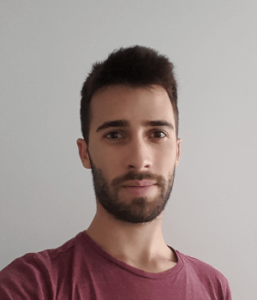Alban Delamarre

Alban Delamarre
Doctoral student Alban Delamarre and FIU alumnus Dr. Jaeson Clayborn recently received a $10,000 grant from National Geographic for their work on a virtual reality game designed to promote butterfly and forest conservation. And it all started because of basketball.
“I was playing on Jaeson’s team, and we started talking about our respective work,” says Alban, a 4th-year doctoral student in Computer Science. “One day he came up with the idea of using video games to teach about nature preservation. I was enthusiastic about that idea and offered to program a prototype of the game.”
That was the genesis of Butterfly World 1.0, an educational game that teaches nature conservation and exploration through butterflies and plants.
“Since the 1st prototype, Butterfly World 1.0 has evolved from a desktop simulation with one butterfly species to an immersive experience in a tropical dry forest ecosystem with over 10 species,” Alban says. “Working with Jaeson, I have learned so much about butterfly conservation and science communication. I visited field sites in South Florida, presented for butterfly societies, shared Butterfly World 1.0 with scientists and teachers in Cuba, and received a National Geographic grant.”
Alban was born and raised in France and received bachelor’s and master’s degrees in Computer Science from the National School of Engineers of Brest (ENIB). He was introduced to Dr. Christine Lisetti’s lab near the end of his master’s study and became interested in her work on virtual classroom simulators that support teacher training. He joined the project in 2016, when he started his doctoral work at FIU.
“I strongly believe that computer science is a tool that should be used for health and education,” Alban says. “When I was presented with the classroom simulator, this project seemed to completely match my vision of computer science.”
Alban has always been interested in computer science and technology. He once worked on an artistic project that used a virtual simulation of the sea to represent brain activity. The project led him on the path to his current work.
“I really like how VR allows me to use my technical skills to be creative,” Alban says. “I really enjoy working on Butterfly World 1.0 because I can apply my computer skills to do something creative and meaningful to society and wildlife.”
After completing his degree, Alban wants to use his expertise in virtual reality to help address issues related to climate change.
“Climate change is the biggest challenge my generation faces,” Alban says. “Computer science and virtual reality can be a great tool to communicate the science and motivate people to act and, basically, bridge the intention-behavior gap through education and empathy. Butterfly World 1.0 has great potential, and we have a lot of ideas for its future applications.”


